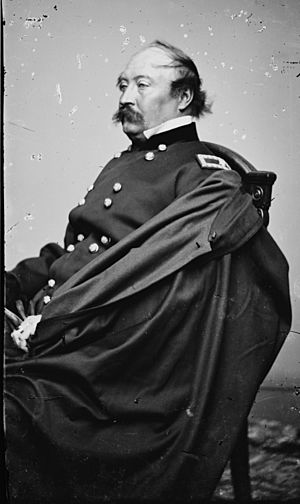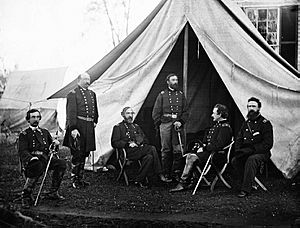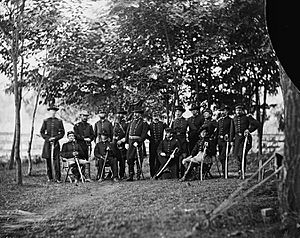William H. French facts for kids
Quick facts for kids
William Henry French
|
|
|---|---|

General William Henry French
|
|
| Born | January 13, 1815 Baltimore, Maryland |
| Died | May 20, 1881 (aged 66) Washington, D.C. |
| Place of burial |
Rock Creek Cemetery, Washington, D.C.
|
| Allegiance | United States of America Union |
| Service/ |
United States Army Union Army |
| Years of service | 1837–1880 |
| Rank | |
| Commands held | III Corps |
| Battles/wars | Second Seminole War Mexican–American War American Civil War |
William Henry French (born January 13, 1815 – died May 20, 1881) was an important United States Army officer. He became a general in the Union Army during the American Civil War. He led a large group of soldiers called a corps in the Army of the Potomac. Later, he was moved from active battle duty. He continued to serve in the Army, leading different military bases until he retired in 1880.
Contents
Early Life and Military Training
William H. French was born in Baltimore, Maryland. He finished school at the United States Military Academy in 1837. After graduating, he became a second lieutenant in the 1st U.S. Artillery.
He fought briefly in the Second Seminole War. Then, he worked at military bases along the Canada-US border for a short time. For the next ten years, he served at other military posts.
Serving in the Mexican-American War
During the Mexican–American War, French was a helper to General Franklin Pierce. He also worked for General Robert Patterson. He took part in the siege of Vera Cruz.
He was promoted twice for being brave. He became a captain after the Battle of Cerro Gordo. He was promoted to major after the battles of Contreras and Churubusco.
Between 1850 and 1852, he again fought against the Seminole Indians in Florida. He was the commanding officer of Stonewall Jackson for a time. French served on the frontier until 1861. He also helped write a book called Instruction for Field Artillery in 1860.
William French in the Civil War

When the Civil War began, Captain French and his soldiers were at Fort Duncan in Eagle Pass, Texas. He refused to give up his post to the Confederate authorities. Instead, he marched his men to the mouth of the Río Grande. From there, they sailed to Key West, Florida.
He was promoted to major and took command of Fort Zachary Taylor. Working with the Union Navy, he helped stop slave traders from using Key West.
Leading Troops in Battle
French became a brigadier general of volunteers on September 28, 1861. He joined the Army of the Potomac. There, he led a brigade (a group of soldiers) in the II Corps during the Peninsula Campaign.
He fought in many battles, including Yorktown, Seven Pines, Oak Grove, Gaines' Mill, Garnett's & Golding's Farm, Savage's Station, Glendale, and Malvern Hill. French was praised for his actions and leadership. He was promoted to lead a division during the Northern Virginia Campaign.
French commanded the 3rd Division of the II Corps at the Battle of Antietam. His troops made the first attack on Confederate soldiers in a place called the Sunken Road. He was promoted to major general on November 29, 1862. He led his division in the battles of Fredericksburg and Chancellorsville.
During the Gettysburg Campaign, French commanded parts of the VIII Corps. He also led the District of Harpers Ferry. After Major General Daniel E. Sickles was wounded at Gettysburg, French took command of the III Corps.
His military reputation was damaged during the Mine Run Campaign in November 1863. Major General George G. Meade said that French's corps moved too slowly. This meant they missed a chance to gain an advantage over General Robert E. Lee. This battle was the last for the III Corps. The corps was reorganized out of the Union Army in the spring of 1864. French left volunteer service on May 6, 1864.
He stayed in the regular army. For the rest of the war, he served on military boards in Washington, D.C. French ended the war with the regular army rank of colonel of the 4th U.S. Artillery.
After the War
After the Civil War, French commanded the 2nd Artillery on the Pacific Coast. He served there from 1865 until 1872. This included leading Fort McDowell in San Francisco Bay. In 1875, he became the commander of Fort McHenry near Baltimore. In July 1880, he retired from the army at his own request. He was over sixty-two years old at the time.
French died in Washington, D.C. He is buried there in Rock Creek Cemetery.
Family Life
William Henry French married Caroline Read (1820–1884). They had six children together:
- Frank French (1842–1865)
- William H. French (1844–1923)
- Anna French Clem (1852–1899)
- Frederick French (1855–1906)
- George French (1857–1895)
- Rosalie French Conklin (1861–1891)
His grandson, John French Conklin (1891–1973), also graduated from the U.S. Military Academy. He became a brigadier general in the United States Army.
 | Sharif Bey |
 | Hale Woodruff |
 | Richmond Barthé |
 | Purvis Young |


